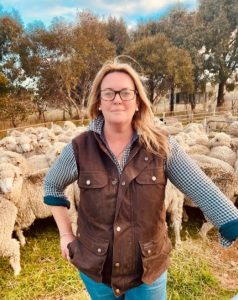
ALEC CEO Mark Harvey-Sutton dockside.
AUSTRALIA’S sheep and wool sector is holding its line on maintaining live sheep exports and improving access to foreign workers as the nation faces the prospect of a Labor Government.
In the face of ALP commitments to initially maintain the Northern Summer live sheep export prohibition and consult with industry on a phase-out, the Australian Livestock Exporters Council is still backing its recent performance as cause to maintain the trade.
ALEC chief executive officer Mark Harvey-Sutton firstly offered congratulations to the incoming government and said the body always committed to working with whomever is in government.
“Our industry’s performance will stand on its own two feet, which we are very proud of.”
He said ALEC’s next steps are engaging with whomever is confirmed as the agriculture minister and working constructively with the government.
“First of all we do need to know who the new ag minister is and our position still stands that the phase-out is unnecessary.”
He said the factors involved included the recent performance of the industry in minimising mortalities and the practical reality of whether the Western Australian sheep industry can transition to full processing with the current workforce shortage in the red meat sector.
“Anyone that knows ag knows that that’s almost impossible anyway.
“Already the (national meat) processing sector is saying that it is 10,000 people short,” he said.
“There is work to be done, but we’ll be taking the view that our results stand.
“The industry has met all of its performance expectations and to maintain this (ALP) policy sets such a concerning policy for all of agriculture that I think it will prove very challenging to implement,” Mr Harvey-Sutton said.
“We have a job to do to make sure we have a sustainable live export sector that includes both sheep and cattle exports.
“The reason we have the live export industry is that it actually works for us; we’ve got markets that demand livestock for food security and we’ve got the production systems that support it.”
A Labor Government would also have to consider Australia’s trade relationship with the Middle Eastern countries sourcing sheep, he said.
“That’s often the forgotten point; we’re actually quite an important geopolitically-important trade, not only for those trading countries’ food security, but a lot of other trading relationships are built off the back of livestock and that’s benefited all of agriculture, if not the broader trading relationships as well.”
Foreign worker access concerns

SCAA CEO Jason Letchford.
Shearing Contractors of Australia chief executive officer Jason Letchford said he was still concerned about the likely extent of ALP’s policy on skilled foreign workers, and whether it would allow shearers from the United Kingdom and America to come to Australia.
During the election campaign, ALP rejected the former Coalition Government’s ag visa plan that was backed by the National Farmers Federation, to attract workers from several countries, including Vietnam.
Labor committed to reforming the Pacific Australia Labour Mobility Scheme’s Seasonal Worker Program and expanding the PALM Pacific Labour Scheme. It said it would establish a dedicated agriculture visa stream under the PALM, creating a robust and sustainable four-year visa, with portability, strong oversight mechanisms, and protections and rights for workers.
Former trade minister Dan Tehan also said the UK-Australian Free Trade Agreement would allow young Australians up to the age of 35 to work and study in the UK for up to three years, potentially opening the door for young skilled shearers to come here.
However, Mr Letchford said the industry should have seasonal access to the skilled Northern Hemisphere workers that New Zealand already has access to.
“It would be remiss of any government to not allow us to be competitive with the likes of New Zealand to access those workers.
“Other than working holiday visas, you still can’t get a skilled worker out of the Northern Hemisphere – you can’t get a shearer out of the Northern Hemisphere,” he said.
“That was the promise back in November (2021) when we were getting those headlines out of the Coalition Government, that we would get the benefits from Brexit and that would include a skilled labour force that would be interchangeable,” Mr Letchford said.
“It’s about staying a competing country who will tap into that labour source and leave us behind, and we will be short again.”
Mr Letchford said he expected Labor would stick to its PALM commitment.
WoolProducers supports live sheep trade and worker access

WoolProducers Australia CEO Jo Hall.
WoolProducers Australian chief executive officer Jo Hall said the peak body congratulated the new Labor government and looked forward to working with it and the new agriculture minister to deliver outcomes for all Australian wool growers.
WoolProducers has developed a number of policy priorities for the new government across the five pillars under the ‘2030 Roadmap – Australian Agriculture’s Plan of a $100 Billion Industry’ that encompass customers and the value chain, growing sustainably, unlocking innovation, people and communities, and capital and risk management.
Ms Hall said WoolProducers continued to support the live export of sheep contingent on adherence to animal welfare standards underpinned by science.
“We will take whatever action is needed to lobby the government to pursue our policy,” she said.
Ms Hall said WoolProducers is supportive of domestic and international labour schemes to access or grow a larger pool of wool harvesting staff.
“Our industry needs a fit-for-purpose visa to access skilled staff, which is why we have asked for the establishment of a visa exchange program with the UK, South America and South Africa for wool harvesting.
“The existing international labour schemes in their current form are not entirely applicable to shearing; however recent amendments to the PALM scheme have been positive,” she said.
“While we are very supportive of the PALM scheme in terms of having the ability to train up new entrants to the industry, this is not a short term solution, which is why we are lobbying for a visa exchange program with countries that have existing skilled shearers and shed hands.”
Ms hall said it was extremely disappointing to learn about the ALP’s animal welfare policies through animal rights groups during the election campaign, particularly when the Shadow Agriculture Minister Julie Collins could not provide any details when asked at the Ag Leaders Debate in late April.
“We hope going forward that the ALP works closely with industry to understand and acknowledge the excellent work that woolgrowers currently do to ensure the health and welfare of their animals.”
Traceability, biosecurity, workforce and live export are SPA issues

Sheep Producers Australia CEO Bonnie Skinner.
Sheep Producers Australia chief executive Bonnie Skinner said the SPA looked forward to working with the new government to progress discussions around national traceability, biosecurity, the importance of agricultural events, investing in the sheep and broader red meat industry, strengthening market access, the live export of sheep and what this means for our Western Australian producers.
“Sheep meat production is a significant industry that supports nearly every region in Australia and has underpinned the prosperity of the country and employed generations of Australians.
“A safe, healthy, and skilled workforce throughout the supply chain, will secure a strong future for sheep producers both domestically and within our global markets,” she said.
“A particular focus needs to be kept on a range of biosecurity threats that would have a severe impact on the sheep industry – on both individual businesses and access to markets, including foot and mouth disease and lumpy skin disease.
“Agriculture means more than just supporting regional Australia and the food and fibre we produce, but what agriculture does for our trading nations, and we need to be ahead of the threats and opportunities that give Australia to ability to provide food security both domestically and internationally,” Ms Skinner said.

Here we have two major rural industry representative bodies doing nothing more than an absolute political sucking-up to a Labor Party government that they know has no or very little regard for the rural sector of Australia. Very disapointing.